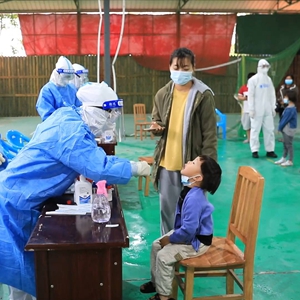Ruili city of southwest China's Yunnan Province is sparing no effort to control the spread of the novel coronavirus after new cluster infections were reported late March.
At a designated hospital specializing in traditional Chinese medicine treatment in the border city of Ruili, where new cases have emerged, medics and experts are making an all-out effort to treat the patients.
"The workload was quite heavy initially but it is getting much less stressful after the arrival of medics from other regions," said Wang Huaiti, director of the rehabilitation department of the hospital.
"The patients are basically in stable condition," said Li Wei, deputy head of an expert panel leading COVID-19 treatment in Yunnan. "The National Health Commission has also allocated the plasma of recovered COVID-19 patients to help with the treatment."
"The doctor comes every day to check our blood pressure and draw blood. I am feeling much better," said Nangapain, a 30-year-old patient from Myanmar, who is receiving treatment in Ruili.
Yunnan reported 15 new locally transmitted COVID-19 cases and two new asymptomatic cases on Monday, all in Ruili. As of Monday, the province had 66 confirmed cases and 46 asymptomatic cases receiving treatment or under medical observation in designated hospitals.
Ruili is also conducting large-scale nucleic acid testing along with home isolation, vaccination and epidemiological survey to best curb the epidemic.
From March 31 to April 1, Ruili completed COVID-19 tests for more than 300,000 people in the city proper. "Nucleic acid test is a precise measure to curb the epidemic," said Yang Mou, Ruili's vice mayor.
As of 2 p.m. Monday, a total of 126,358 doses of COVID-19 vaccines had been administered in the city. "I feel safer after receiving the jab," said Hu Jianyong, a local resident.
Meanwhile, Ruili launched the second round of nucleic acid testing that includes all residents of the city proper starting Tuesday. On Monday, the city added three high-risk and three medium-risk areas for the COVID-19 outbreak.
Produced by Xinhua Global Service




